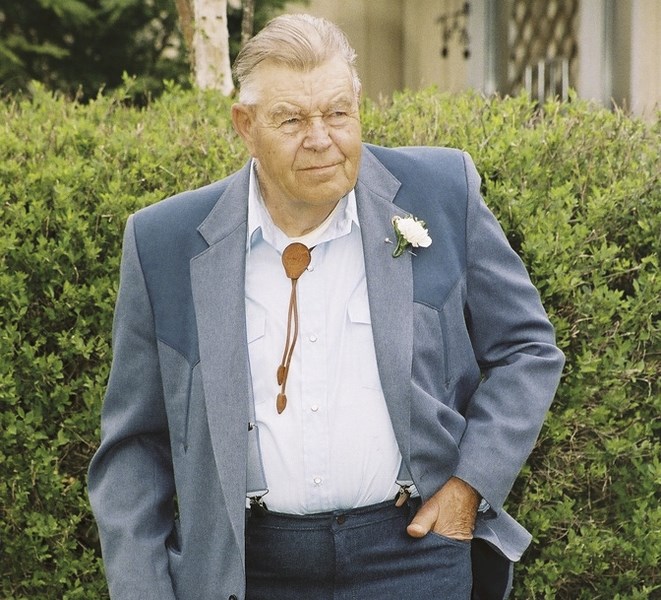An icon in southern Alberta agriculture has “gone to manage the grasslands of heaven.”
Those are the words Ed Nelson’s family used in the 92-year-old’s obituary after he passed away on Nov. 27. He was known as a man with a big heart, and a passion for agriculture.
“He was a big man, he was six-foot-four and probably weighed 250 pounds, he was a big guy, but he was never a big property owner,” said son Tim Nelson. “He didn’t own thousands of acres himself, he just had 1,000 acres here. Just always thinking how he could help everybody else is the main thing.”
Ed started helping other farmers after serving in the Royal Canadian Navy in the Second World War. When he returned home to the Stavely area, he was determined to grow Canada’s cattle industry and help veterans while he was at it.
Initially, he worked with Spruce Grazing Co-op west of Nanton, but went on to start his own venture.
Along with a handful of other veterans, Ed purchased the now-world-renowned Waldron Ranch Grazing Co-op, in the Foothills southwest of Longview along Highway 22. The vets raised $1 million together to open the grazing co-op, which included about 40,000 acres in the beginning.
“His big thing was to try to get land for the veterans, just to buy land so the veterans could run their cattle in the summertime and then bring them home in the wintertime and feed them,” said Nelson. “He wanted to band them all together.”
Though Waldron Ranch began as a way to help veterans, it grew to include other local farmers and ranchers as well. Shares in the land were sold, and the number of shares owned by a partner determined the number of cattle that could be grazed on the land, said Nelson.
With the help of a loan from the Bank of Montreal, the ranch was able to finance 75 per cent of its land, and the buy-in was 25 per cent of the share value, he said.
“It was actually quite an ingenious thing to do,” said Nelson. “To be honest, it was very forward-thinking philosophy. They ran Waldron so it could be best for everybody.”
Waldron Ranch has become a model for grazing co-ops around the world, he said.
Ed never stopped working to ensure the grasses on the land were the best in order to raise quality cattle, which often meant bringing in people to conduct studies and implementing the recommendations that came out of them, he said.
Waldron Ranch grew over the years to 51,000 acres. Then in 2013, the group purchased 14,000 acres from the King brothers, who were 92 years old and had lived on their land all their lives.
Today, Waldron Ranch boasts 65,000 acres of forested, grazing, and peated land.
There were other feats over Ed’s years. He helped salvage the Stavely Livestock Auction Market, which many southern Alberta farmers and ranchers relied on, by creating another co-op in the 1970s to keep it running.
He also helped start up the Willow Creek Surface Rights Society when it became clear the oil and gas industry would continue expanding into southern Alberta. The organization helped farmers negotiate with oil and gas companies, said Nelson.
One of Ed’s biggest coups was going up against the Canadian Wheat Board in the late 1970s, he said. A group of 53 farmers had over-delivered to the granary in Stavely and were begin charged by the Wheat Board because it was illegal to take grain to an elevator without a quota to sell it.
“It was the Alberta Wheat Pool elevator, which was a farmer-owned co-operative, and the operator said we could store the grain there until we could sell it,” said Nelson. “That’s the way we thought it should work. It didn’t quite go that way because the Canadian Wheat Board got a hold of it and said we couldn’t do that.”
All the farmers were charged, then offered a plea bargain to reduce charges if the farmers admitted they shouldn’t have stored their grain in the elevator.
“So 52 of them said okay, but Dad said, ‘Screw you, I’m not wrong. This is our business and this is our elevator, we can do what we want,’” said Nelson. “He actually continued on and fought it, and he was the only one who got an absolute discharge.”
Ed never appreciated the Canadian Wheat Board, which he said was a government organization trying to control farmers. One of his happiest days was when the wheat board was dissolved in 2015, said Nelson.
A staunch conservative, Ed was one of the founding members of the Reform Party along with Preston Manning.
“He was always very involved with politics,” said Nelson. “Even a year ago he said to me, ‘Tim, I want to send a cheque to the Jason Kenney campaign.’ It was important to him, that conservative attitude and capitalistic economy.”
Ed was also very active with service clubs throughout his life, becoming a member of the Elks, the Oddfellows and the Legion, as well as others.
He was instrumental in erecting bronze plaques to mark historical rural schools and post offices, and then having a book written about the buildings to commemorate their heritage, said Nelson.
In 2017, he was recognized as one of 150 people who received a Canada 150 medal from MP John Barlow for his service and dedication to his province, country and industry.
“He’s one of those guys you don’t hear much about until after he’s gone, then you think, he did a lot of stuff, a lot of behind-the-scenes,” said Nelson. “Dad worked his butt off all his life. He probably helped more people than you could imagine.”




